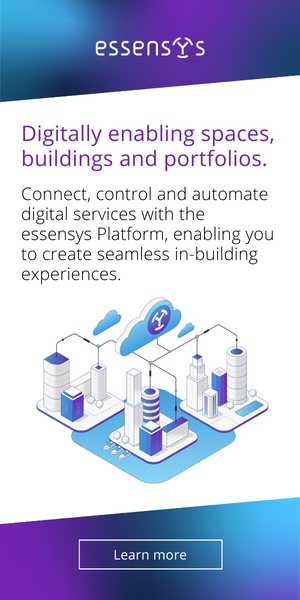ChinaTech Competition and the Impacts to the Built Environment

"The United States is not the world's sole technology superpower. China's technological progress is undeniable...In looking at the key dimensions of technology competition, a picture emerges of an intensifying challenge...History suggests that the nations capable of harnessing these technology waves are best positioned to win the future." (SCSP Mid-Decade Challenges to National Competitiveness - Sept. 2022)
My first contact with the topic of China and Technology occurred at our 2002 Realcomm conference. I was moderating a session on smart buildings, and an audience member asked if I had ever been to Asia. I answered that I had “been to Japan but not in the context of building technology.” He responded, “If you are not aware of smart buildings in Asia, you have no right moderating the panel.” I brushed it off and went on with my business.
The following year we did a similar session and the same person was there (apologies, I have no recall of their name). They again asked, “Have you been to Asia yet?” I responded “no” and they left the session. Immediately after the conference I reached out to a friend who worked for one of the largest Internet infrastructure companies in the world and said, “I am going to Asia to look at smart buildings. Do you want to join me?” For the next six months we created an agenda that included five continents, seven cities and over 30 buildings and projects. From Tokyo to Singapore, we looked at some of the most intelligent buildings in Asia, if not the world.
To say the trip was overwhelming would be an understatement. We had seen things at scale that did not exist in the United States - or elsewhere. From connected portfolios to smart toilets, we simply could not believe it all. About a month later, we met in San Diego to digest the information and then presented “Asia is on Fire!” to the world.
I initiated conference presentations talking about ChinaTech and the impact to the built environment: the energy, focus, magnitude, discipline, vision, scale, work ethic and passion. Understandably, it was hard for the audience to grasp the magnitude, given they had not seen the projects firsthand. After a few years, the topic was resonating less and less and we simply chose to discontinue for lack of interest. It wasn’t until the 2019 conference in Nashville that we gathered a small group of high-level executives to restart the discussion.
Fast forward to 2022 and things have changed significantly. People have become much more aware of just how fast China has advanced their technological prowess in many different tech sectors. Rare earth minerals, AI, facial recognition, quantum computing and telecommunications, LED technologies, solar and other renewable tech (such as batteries), 5G and other advanced fixed and wireless solutions, consumer and business drones, as well as a multitude of other innovations.
As we move into the next phase for the built environment, technological advancements will be at the center of the race. For example, at the Tencent Headquarters in China, employees pay for their lunch with facial recognition. (By the way, there is still much needed debate as to whether or not we want this technology from a privacy perspective.) Other impacts will be telecommunication infrastructure, artificial intelligence-based building operations, mobile technologies, operational data collection, management, analysis and distribution, ESG, all conversation relating to a distributed workforce, immersive experiences, new electrical power options, autonomous vehicle relationships with the smart building grid, cyber security, privacy and much more. For a closer look at the comprehensive and organized approach China is taking in respect to smart buildings, districts and cities you can visit these websites:
XPENG
To help us better understand these growing risks and opportunities we are working with Google’s Dr. Eric Schmidt’s newly formed organization, the Special Competitive Studies Project (SCSP) which was modeled after Nelson Rockefeller’s Special Studies project (created after WWII). The purpose of this new organization is to facilitate and moderate a conversation between the private and public sectors to make sure we operate in the most efficient and effective way in the mission to maintain the United States’ dominant global position on all the technologies that will shape the future for generations to come.
It has always been important for the built environment to embrace technology and innovation. Whether it is better interaction with tenants, a solid telecommunications infrastructure, software platforms that optimize business operations, or a real understanding and plan to combat carbon emissions, the built environment is at the center of every critical conversation. China’s goal of global technology dominance brings further motivation for us to create competitive action strategies that ensure the continuation of our way of life.
Realcomm is reintroducing this topic to our community with hopes that the message and mission will resonate with the built environment and that our path to defining global standards for the technology side of our industry will be achieved.
In line with this objective, we will be introducing SCSP to our CoRE Tech audience at our event in Silicon Valley on November 15. Warren Wilson, Director for the Economy at SCSP, will be speaking to the leading corporate real estate, facilities and workplace executives on this important topic, and specifically their potential role in the 5G and beyond discussion.
This Week’s Sponsor
Retransform is a global real estate services provider that has spent the last 2 decades developing a specialized expertise in offering business management, technology and analytics solutions to the industry across the globe. They fundamentally are dedicated upon improving operational efficiencies while simultaneously driving bottom line benefits.
Read Next
 5/15/2025
5/15/2025
Tech, Talent and Transformation: 2025 Digie Finalists Announced For 27 years, Realcomm has presented the Digie Awards to acknowledge companies, real estate projects, technologies, and individuals that have advanced the commercial real estate industry through the strategic use of technology, automation, and innovation.
 5/15/2025
5/15/2025
Empowering Space Management with Data-Driven Visualization For effective CRE space management, it’s critical to centralize lease data, maximize rental square footage (RSF), improve energy efficiency and reconfigure spaces to meet changing needs.
 5/8/2025
5/8/2025
The AI-Powered Workplace Evolution: Redefining the Business Landscape In today's rapidly evolving business environment, the fusion of Artificial Intelligence (AI) and Workplace Management is revolutionizing the way organizations approach workspace optimization and operational efficiency.
 3/27/2025
3/27/2025
The Convergence of Edge Computing, Cloud, and AI in Building Automation and Smart Buildings In the built environment, we have seen the convergence of Operational Technology (OT) and Information Technology (IT), later expanding to include Workplace Technologies (WP).









%20(1)%20(1)%20(1).png)



